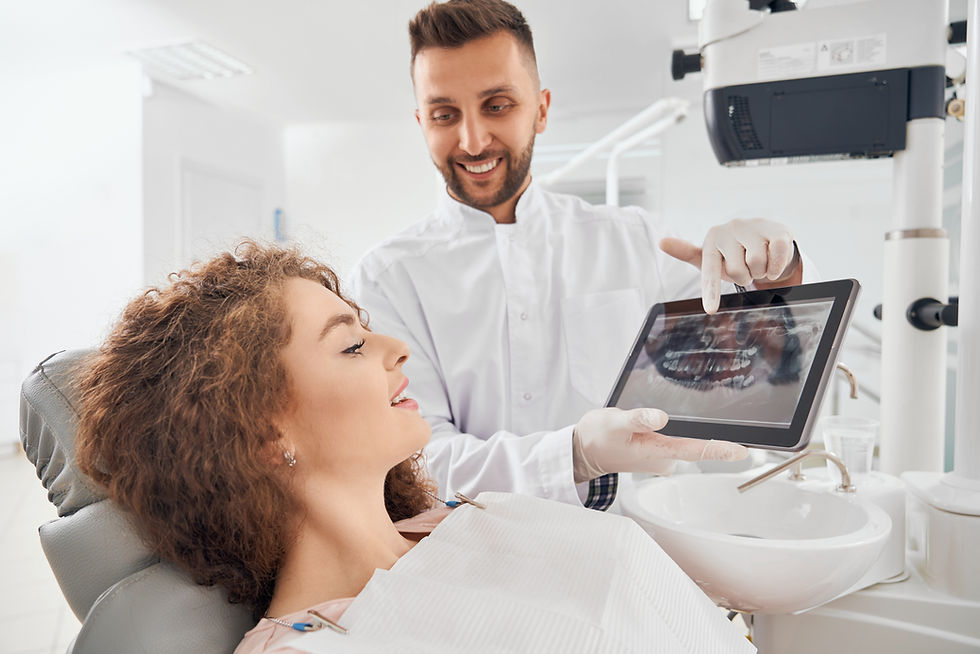Root Canal Recovery: What to Expect After Your Procedure
- Smiles of Virginia
- May 30, 2025
- 4 min read

When we talk about root canals, the first thing that comes to our mind is the root canal pain. However, infections in the tooth pulp can be treated by a root canal. Typically, root canals are painless these days. Therefore, brushing your teeth after meals can help you prevent getting a root canal and going through regular dental check-ups. Also, to understand the root canal recovery process, please read this blog.
Root canal recovery is an option to relieve dental pain:
Infections of the tooth pulp, the innermost layer of the teeth, can be treated with a root canal process, which is the easiest process these days. Endodontists perform approximately 15 million root canals annually. Removing the infection from the dental pulp is the main goal of a root canal recovery. Hence, it is one of the easiest options to minimize the risk of severe infections.
What to Expect After a Root Canal:
When you get a root canal, your tooth experiences a deep clean that will leave the mouth feeling soft after the process has been completed. A little root canal pain is very normal, and root canal specialists have also said that. After that, you will see your root canal specialist to get your permanent crown. For many people, the pain takes one to two days to go away.
1. How long will you be numb?
The local anesthetic will numb your tooth and surrounding tissue for a few hours, and will do the remaining process after this. And this will take several hours to wear off completely. In that case, avoid chewing and drinking hot liquids.
2. How soon can you eat and drink after the root canal is done?
Please avoid having hot liquids and foods that need chewing until the anesthesia has worn off. Then you can eat anything that is prescribed by your root canal specialist.
3. Will you be able to go back to your work after the root canal is done?
Yes, definitely. However, please make an effort to comprehend that if your profession involves interacting with the public and speaking frequently, you should take a day off. The reason behind this is that it will impact your ability to smile and speak.
4. Is it ok to brush your teeth after the root canal is done?
Yes, following the completion of the root canal procedure, you can return to your regular oral hygiene regimen. But, we suggest that you should wait for at least 30 to 40 minutes to ensure that the temporary filling is hardened before brushing.
5. Do you need some other treatment after your root canal is done?
Yes, you will need to see your dentist after your root canal is over for a permanent restoration.
What is the Immediate Aftercare post root canal?
After the root canal is done, it is crucial to prioritize healing. This involves avoiding eating until the numbness goes off, using pain relievers, and applying cold compresses to deal with swelling.
Steps:
Avoid eating or drinking until the numbing medication has been eradicated. This will help in preventing accidental bites to the tongue and cheeks.
If you experience root canal pain, then get in touch with your root canal specialist immediately. They will prescribe medications depending on the pain.
Cold compresses should be used. That is to use an ice pack to treat the swelling and root canal pain.
Use an antibacterial mouthwash to prevent root canal infection.
What to Eat and Drink, Healing Time:
To manage pain, it is crucial to use foods that are rich in Omega-3, such as Fatty fish like Salmon, fruits and berries, green leafy vegetables, whole grains, nuts and seeds, and turmeric and ginger.
Healing time:
It generally varies depending on the type of injury or condition you have. Generally, it takes 1-2 days to heal your root canal pain. But if it goes beyond that, then get in touch with your root canal specialist.
Signs of Complications if they happen:
After going through a root canal process, it is crucial to look for the signs of complications or infections. Prevent the spread of a potential infection but consult your dentist immediately.
Signs:
1. Persistent pain and tooth sensitivity.
2. Tooth discoloration can happen.
3. Chronic bad breath can also take place.
4. Fever.
5. Fatigue.
What will be the Long-Term Care after a Root Canal?
Start practicing good dental hygiene that includes:
1. Brush your teeth twice with fluoride toothpaste for at least two minutes.
2. Flossing at least once daily.
3. Using an electric toothbrush for more effective cleaning, as recommended by your root canal specialist.
Protection and restoration:
Your root canal specialist will recommend a dental crown because:
1. They protect the weakened tooth structure from any injury or damage.
2. Providing additional strength.
3. Replacing the crown if signs of damage appear.
Regular dental checkups:
1. Make sure to schedule your dental check-ups regularly.
2. Informing your root canal specialist about your root canal history.
Advantages of root canal:
1. Relief from pain and discomfort.
2. Avoiding an abscess and damage to the oral bone.
3. Prevention of infection from spreading is critical because the condition can become serious.
4. It is a more affordable alternative to replace the tooth with an implant.
5. Having a gap in your teeth will cause them to shift, and changing your bite might be uncomfortable.
Conclusion:
It is mandatory to schedule your appointment with a root canal specialist like us if you have any pain after or before your root canal process is done. So, get in touch with us because we offer you the best dental care.
Also, if you are concerned about your infected or damaged teeth, you can see us anytime soon. To book an appointment with us, visit our website or give us a call.






Comments